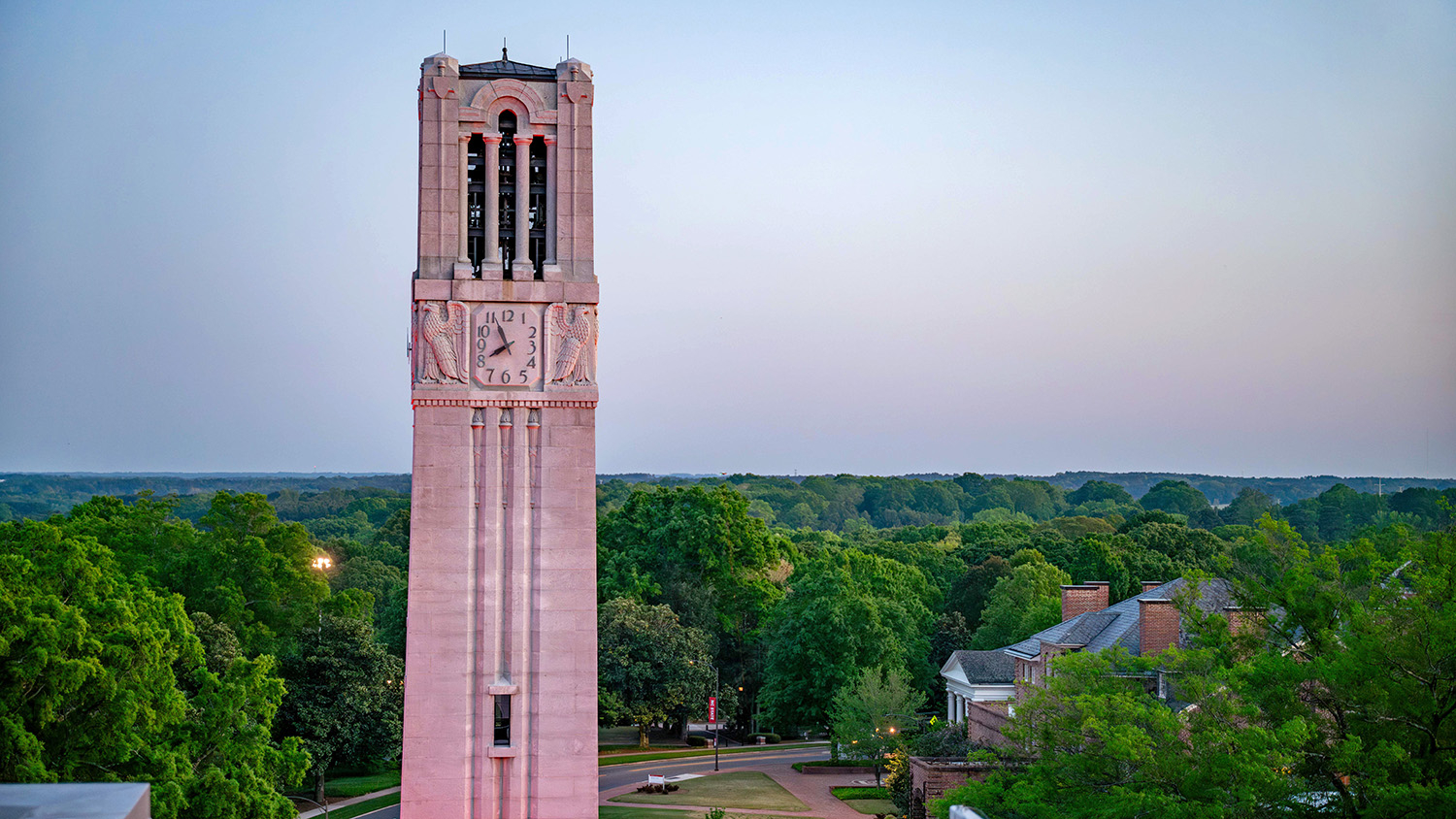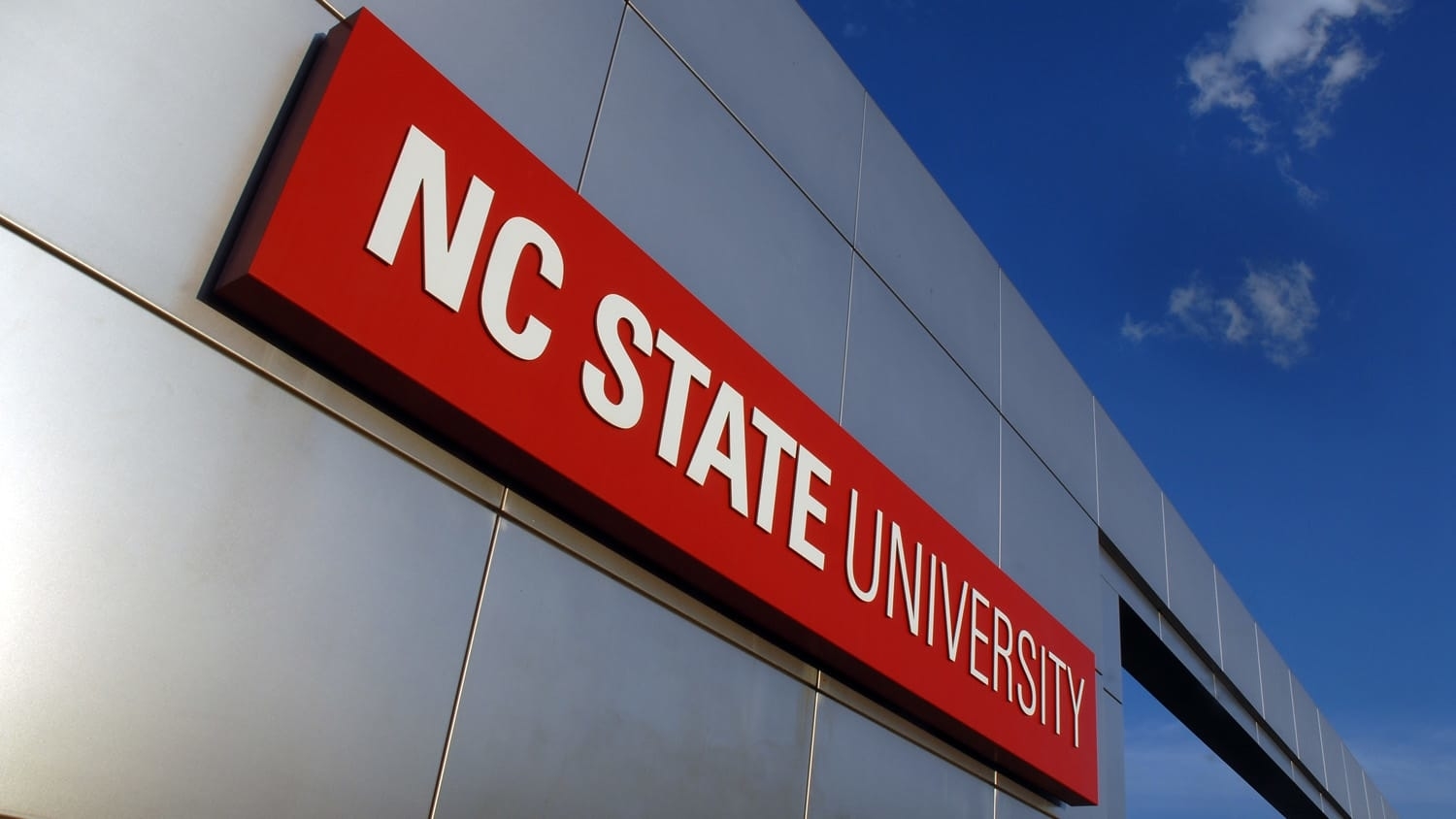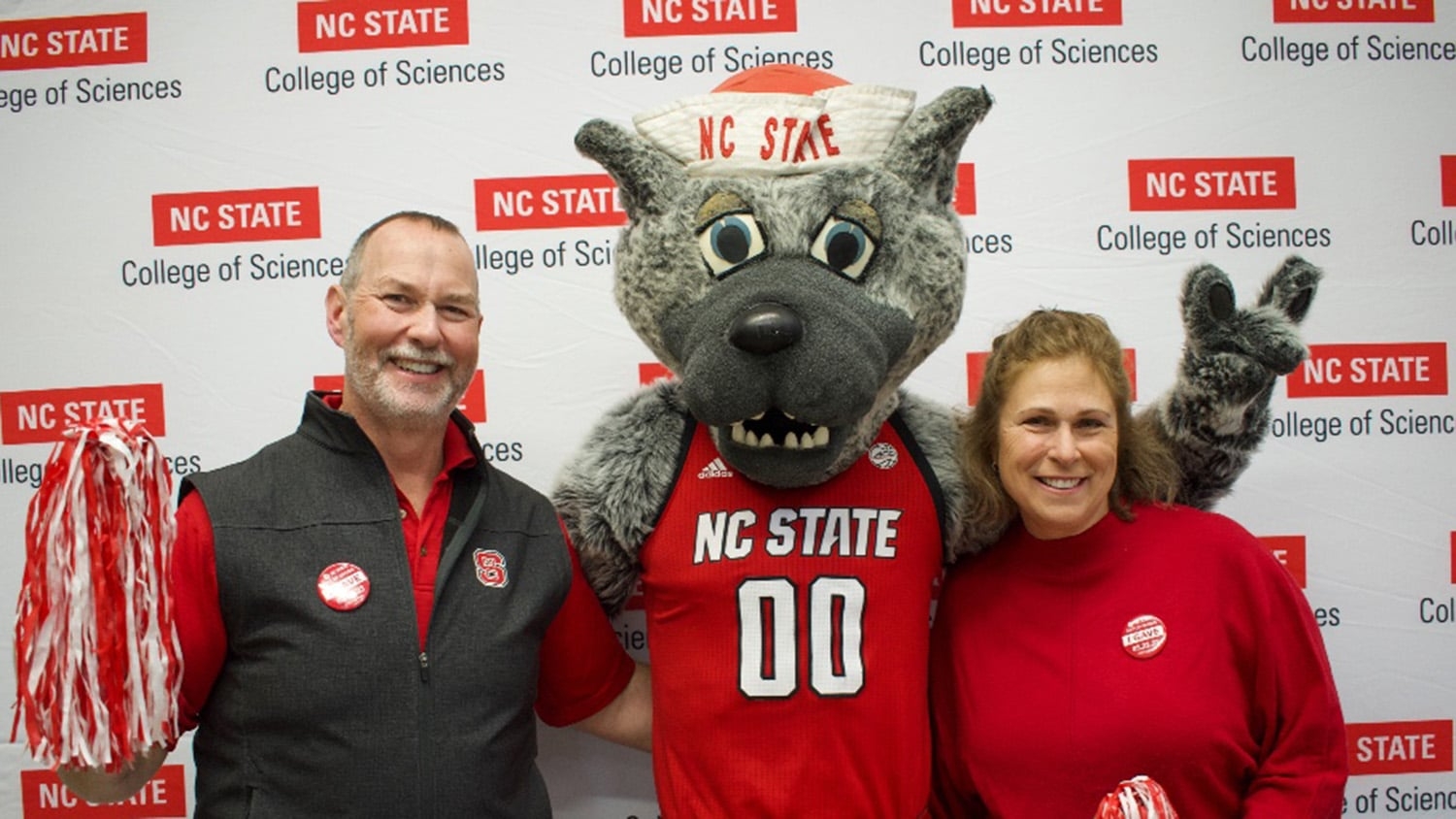Meeting the Demand for BioSci Undergraduate Research
By Jerry LeBlanc
The department of Biological Sciences is true to the mission of a major research institution with more than 30 active research laboratories that delve into cutting-edge issues ranging from the workings of the brain to the harm caused by chemicals in our environment. This abundance and diversity provides opportunity for undergraduate students to participate in authentic research experiences. The department views this as a critical part of undergraduate training and such experiences are in high demand by our students. Providing an authentic research experience to all students who desire the experience is a significant goal of the Department. However, with more than 1,500 undergraduate students, this goal is daunting. The department has taken a multi-pronged approach to addressing this need.
Training with Departmental Research Scientists
A common concern voiced by students was, “How do I find a faculty member to train with?” To this end, Academic Advisor Dana Thomas established the CURiOuS website(Connecting Undergraduates to Research Opportunities in the Sciences). This match-making site helps connect faculty and students with common research interests (learn more about the CURiOuS website in issue 1 of the BioSci Scope). As a professor of Toxicology for the department, since posting a research opportunity on the CURiOuS website, I’ve had a steady stream of students expressing interest in training in my lab. Students train for one semester, either for credit or as volunteers, so that I can provide a research experience to as many students as possible. Since posting, I’ve had three to five undergraduates training in my lab at all times.
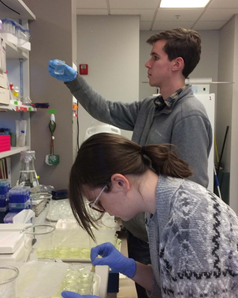
Tanner Tucket and Olivia Helvey are two undergraduate students currently training in my lab. Both sought an authentic research experience to expand their skillset and to enhance their resumes. The experience of working with a team of scientists has had a significant positive impact on both. “It’s fascinating to have different people working on different pieces of the same puzzle and seeing how it all comes together,” said Tanner.
Assistant Professor of Genetics Reade Roberts typically has four to six undergraduate students training in his lab. He notes that no two students are alike and duties assigned vary with the level motivation and skill of the student. “In my group,” Reade explained, “an entry-level undergraduate position often involves fish facility support, which is not so glamorous, but essential for the lab to function. Other students are awesome at mastering a particular technique and churn through hundreds of samples, providing skilled support for projects.” Roberts noted the sense of accomplishment felt as the student develop from a naïve individual with little self-confidence to an independent, confident thinker. “The ideal students become true young scientists, invested and owning their project, sometimes bringing their own novel insight [to the research],” he added. Assistant Professor of Neuroscience John Meitzen shares this positive view of undergraduate trainees, noting that they bring energy and fresh perspectives to research problems. According to Meitzen, “Undergraduates are amazing, dedicated, and fun!”
Research Pack Track
Another resource for undergraduates the Research Pack Track program, which provides guided research experiences over two semesters. This Biological Sciences program targets freshman and sophomores who are contemplating careers in lab research. During the first semester, students are taught the basics of the scientific method, to interpret published research articles, and to analyze scientific data. Under the guidance of a mentor, students also prepare a research proposal that defines the research project the student will undertake during the second semester. The second semester is spent in the laboratory, where experiments are performed and results interpreted. Ultimately, students construct a poster presentation of their research, which they present at a department symposium. Some students go on to present their work at other venues such as the University Undergraduate Research Symposium and the annual meeting of the North Carolina Academy of Sciences.
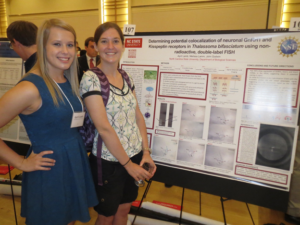
Research Pack Track has steadily grown under the leadership of Teaching Assistant Professor Mary Beth Hawkins and Teaching Associate Professor, Miriam Ferzli. In addition to Hawkins and Ferzli, mentorship is provided to the students by John Godwin, Lisa Paciulli, Lisa McGraw and Michael Taveirne. Students also are provided the opportunity to interact with and train under the guidance of post-doctoral researchers and graduate students. The opportunity to mentor undergraduates provides benefits to these senior trainees as it stimulates them to evaluate their own work from a new perspective and teaches them mentoring skills through hands-on experiences.
CURES
Classroom-based undergraduate research experiences (CURES) are typically laboratory sessions that are associated with established courses. Historically, these lab sessions consisted of standardized lab experiments where the outcome is known to the teacher. CURES consists of true experimentation with the goal of generating new knowledge regarding real-world problems. Like Research Pack Track, students are taught to approach problems logically, first defining the issue, then planning, executing and analyzing the experiments that they design to address the problem.
Teaching Assistant Professors Michael Taveirne and Alice Lee are among several departmental faculty and staff involved in the development and implementation of CURES. Taveirne notes that students take ownership of and pride in their work under the CURE format. Lee has observed that CURES not only light a flame of passion for laboratory research in some students, but help some students to recognize that laboratory research is not their forte, thus allowing them to fine-tune the direction of their academic training and ultimately career choices.
An example CURE spearheaded by Lee and Taveirne focuses on a central question: How does the salt concentration in pickling brine affect microbial populations during cucumber fermentations? Salt is used in the fermentation process to allow growth of beneficial bacteria while inhibiting the growth of spoilage microorganisms. Students work together to assess the microbial communities of cucumber fermentations in different salt concentrations, to identify the lowest salt solution needed to create a high quality, and safe, fermented product.
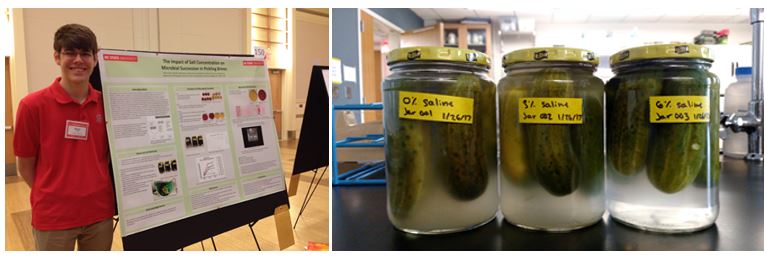
The number of success stories associated with undergraduate research experiences in our department could fill a book. Here is a sampling:
Allyson Ryan performed experiments that identified the sex-determining region in the genome of a cichlid fish species. Her results provided the foundation for later research publications and the acquisition of a National Science Foundation grant for the lab.
Katie Jenkins is a driving force behind a study of the microbiome associated with human skin. She is collaborating with scientists at the NC Museum of Natural Sciences and serves as a bridge who is fostering collaboration between the department and the museum.
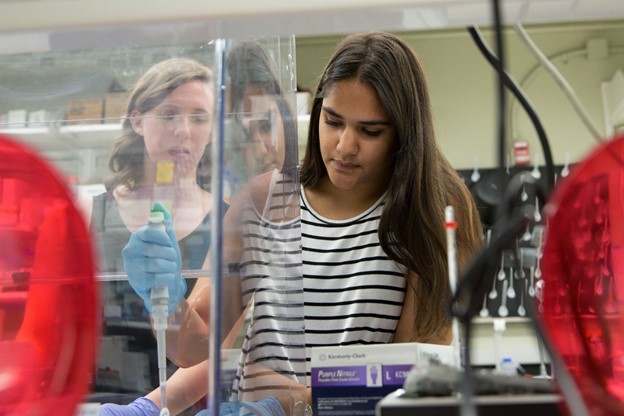
Between learned lab skills, and the training to think like a scientist, the value of undergraduate research experiences in a major research institution like ours is priceless. Our trainees have won awards for scientific accomplishment, been awarded research grants, and presented their work at scientific conferences. They have co-authored scientific papers, and accordingly, have gained international recognition. As noted by sophomore research trainee Olivia Helvey, “the skills learned in an authentic lab research experience are diverse and invaluable…You’re always anxious to see the results of your experiment, but you know that you must be methodical and conscientious for your results to have any meaning.” Through these skills, research experiences plant the seeds of success for our students, who commonly go on to graduate school, medical school, or successful careers in academic, government, or private sector. What breakthroughs will our undergrads find next? Stay tuned.
